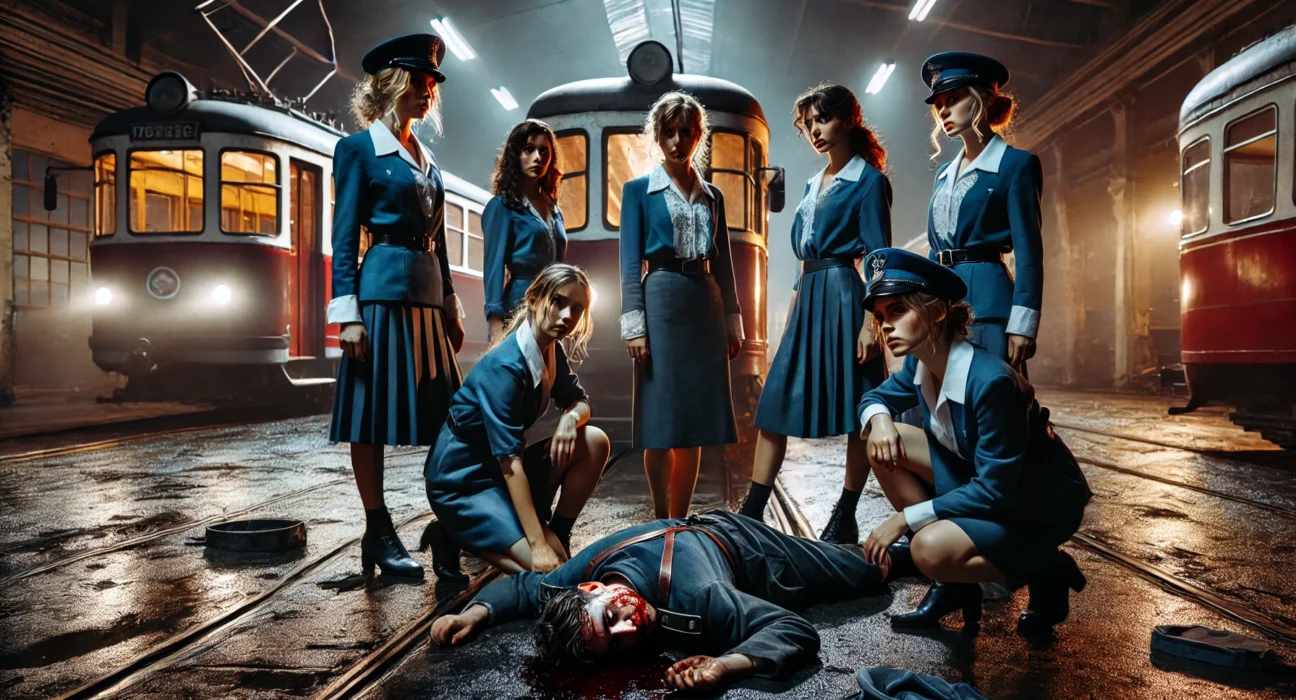“Tickets, Please!” is a short story by David Herbert Lawrence, first published in 1919. Set in the industrial heartland of England during the early 20th century, the story unfolds against the backdrop of a bustling and perilous tram service, entirely conducted by young women and driven by men either too young, too old, or unfit for active service. The narrative focuses on the complex dynamics of power, gender, and retribution, encapsulated in the tumultuous relationship between Annie, a fierce and capable tram conductor, and John Joseph Raynor, the charming but manipulative inspector.
Comprehensive Plot Summary
In the industrial North of England, a solitary tram line cuts through the blackened landscape, winding its way through grimy villages and over desolate canals. The blue and cream-colored tramcars journey through this bleak terrain, seemingly possessed by a daring spirit as they hurtle downhill and skid around corners. The tram service is a perilous one, known for its wild rides and reckless drivers, many of whom are men either too young or physically unfit for military service. But it is the young women conductors, in their stiff blue uniforms and peaked caps, who command attention with their fierce and unyielding demeanor.
Annie, a tram conductor, is among these women. She is tough, with a sharp tongue and an assertive presence, patrolling the tram like a sergeant, ensuring that all tickets are paid and that no passenger slips by without her notice. In the chaotic world of the tram service, the women conductors have learned to hold their own against the rowdy, often crude passengers, particularly the miners who ride the trams from village to village, seeking a change of scenery, a different cinema, or a new pub. The tram itself becomes a microcosm of life, with its clanging bells, the constant sway and rattle, and the tense, vibrant energy of its occupants.
John Joseph Raynor, the chief inspector, stands out in this world. With his long oilskin coat and peaked cap set low over his eyes, he has a certain swagger that draws the attention of the girl conductors. He is known to flirt with them, his impudent smile and quick wit making him a familiar figure among the women. John Joseph is a man of contradictions, his charm masking a more manipulative side. He flits from one girl to another, his attention as fleeting and unreliable as the trams themselves. Despite his roguish behavior, he carries an aura of authority that commands both respect and resentment.
Annie watches John Joseph with a mix of curiosity and wariness. She is not like the other girls who fall easily for his charms. She has her own boyfriend, yet there’s something about John Joseph that intrigues her, something that sets him apart from the usual men in her life. They share an unspoken understanding, a recognition of each other’s strengths and the roles they play in the intricate dance of tram life. Their interactions are filled with a charged energy, a push and pull that neither fully acknowledges nor entirely denies.
Their relationship takes a turn one evening at the Statutes Fair in Middleton. The fair is a cacophony of lights and sounds, with roundabouts and switchbacks, coconut shies, and side shows. Amidst this chaotic merriment, Annie encounters John Joseph. He is dressed in a black overcoat, his face ruddy and smiling beneath his cap. Together, they ride the switchbacks, the thrill of the ride and the closeness of their bodies creating a new intimacy between them. For a moment, the world outside the tram, the gritty reality of their lives, falls away, leaving only the exhilaration of the fair and the warmth of each other’s presence.
Later, they find themselves in the darkness of a cinema, where John Joseph’s advances become more intimate. In the shadows, he draws Annie close, and she finds herself yielding to his warmth, to the comforting fit of his arm around her shoulders. It’s a fleeting moment, yet it marks a shift in their dynamic. Annie, always so guarded and in control, allows herself to be drawn into John Joseph’s world, into the dangerous allure of his charm. Their affair becomes a secret, a shared thrill that both excites and unnerves her.
But Annie is not content with being just another girl in John Joseph’s string of flings. She wants something more from him, a deeper connection, a recognition of her as an individual rather than a mere conquest. John Joseph, however, is not a man to be pinned down. He thrives on the game, on the thrill of the chase, and when Annie begins to press for more, he recoils. He distances himself, turning his attention to other conductors, leaving Annie feeling betrayed and humiliated.
Her initial shock and heartbreak soon transform into a burning desire for revenge. Annie is not one to be scorned lightly. She knows the other conductors have also suffered at John Joseph’s hands, each one used and discarded when he grew bored. She gathers them together, forging a pact of retribution. They plan to confront him, to exact a form of justice for his cavalier treatment of them. The tram depot, usually a place of routine and order, becomes the setting for their reckoning.
On the fateful night, John Joseph is lured into the girls’ waiting room at the depot. He enters with his usual confidence, unaware of the trap laid for him. The atmosphere is thick with tension as the girls surround him, their eyes gleaming with a mixture of malice and excitement. Annie stands at the forefront, her gaze fixed on him with a steely resolve. What begins as playful banter quickly escalates. The girls, emboldened by their numbers and their shared anger, close in on him. John Joseph, caught off guard, attempts to maintain his bravado, but the mood has shifted. The teasing turns into a full-fledged assault. They attack him with a ferocity that surprises even themselves. Slaps, pinches, and shoves come at him from all sides, the girls releasing all their pent-up frustration and rage. John Joseph, once so sure of his charm and control, is brought down, his uniform torn and his face scratched and bleeding. He is reduced to a figure of defeat, his earlier swagger replaced by a desperate, animalistic struggle for escape.
Annie, her eyes blazing, demands that he choose one of them to marry, a cruel twist that forces him to confront the hollowness of his flirtations. Under duress, he mutters her name, choosing Annie, but she rejects him with cold disgust. The other girls, having vented their anger, leave him there, a broken man amidst the debris of his uniform and his pride.
As he stumbles out into the cold night, the girls begin to put themselves back together, their faces a mixture of satisfaction and unease. They have exacted their revenge, but the act has left a lingering sense of emptiness. Annie watches him go, her heart a tumult of conflicting emotions. She has proven her strength, but the victory feels hollow. The night air is harsh, mirroring the stark reality of their lives, and as the tram depot falls silent, the weight of their actions hangs heavy in the air. Annie, now alone in the quiet, must reckon with what has been gained and lost in this act of retribution.
Main Characters
- Annie: A tram conductor characterized by her toughness and resilience. Annie’s sharp tongue and fierce independence make her a formidable presence among her peers. Her complex feelings for John Joseph drive much of the story’s tension.
- John Joseph Raynor: The charming but manipulative tram inspector who flirts with the girl conductors. His superficial charm and unwillingness to commit emotionally ultimately lead to his downfall.
- Nora Purdy: A tall, secretive conductor with beautiful yellow hair. She is more vindictive than Annie and plays a key role in the plan to confront John Joseph.
- Muriel Baggaley: One of the girl conductors, Muriel is vocal and participates eagerly in the assault on John Joseph.
- Laura Sharp: Another conductor, known for her wit and readiness to challenge John Joseph.
Themes and Motifs
- Gender and Power: The story explores the dynamics of gender and power, highlighting the tensions between the male inspector and the female conductors. The reversal of power during the assault on John Joseph serves as a critique of his manipulative behavior.
- Revenge and Retribution: The theme of revenge is central to the narrative, as Annie and the other conductors take justice into their own hands, confronting John Joseph for his betrayals.
- Identity and Independence: Annie’s struggle for recognition and respect underscores the theme of identity and independence. Her rejection of John Joseph’s insincere commitment reflects her desire to assert her own worth.
- Class and Industrialization: The industrial setting and the rough, working-class environment provide a backdrop that influences the characters’ interactions and the story’s events. The harsh conditions of the tram service mirror the broader societal struggles of the time.
Writing Style and Tone
David Herbert Lawrence employs a vivid and dynamic writing style in “Tickets, Please!” His prose is marked by rich descriptions and a keen observation of human behavior. Lawrence’s use of dialect and colloquial language adds authenticity to the characters’ voices, grounding the story in its industrial setting.
The narrative tone is both gritty and poetic, capturing the raw energy of the tram service and the emotional turbulence of the characters. Lawrence’s ability to depict intense, almost violent emotions with lyrical grace is a hallmark of his style, making “Tickets, Please!” a compelling exploration of human relationships and social dynamics.
We hope that this summary has sparked your interest and would appreciate you subscribing to our newsletter.
There’s a treasure trove of other fascinating book summaries waiting for you. Check out our collection of stories that inspire, thrill, and provoke thought, just like this one by clicking here.
Remember, while our summaries capture the essence, they can never replace the full experience of reading the book. If this summary intrigued you, consider diving into the complete story – buy the book and immerse yourself in the author’s original work.
If you want to request a book summary, click here.
When Saurabh is not working/watching movies/reading books/traveling, you can reach him via Twitter/X, or LinkedIn.
Restart reading!






